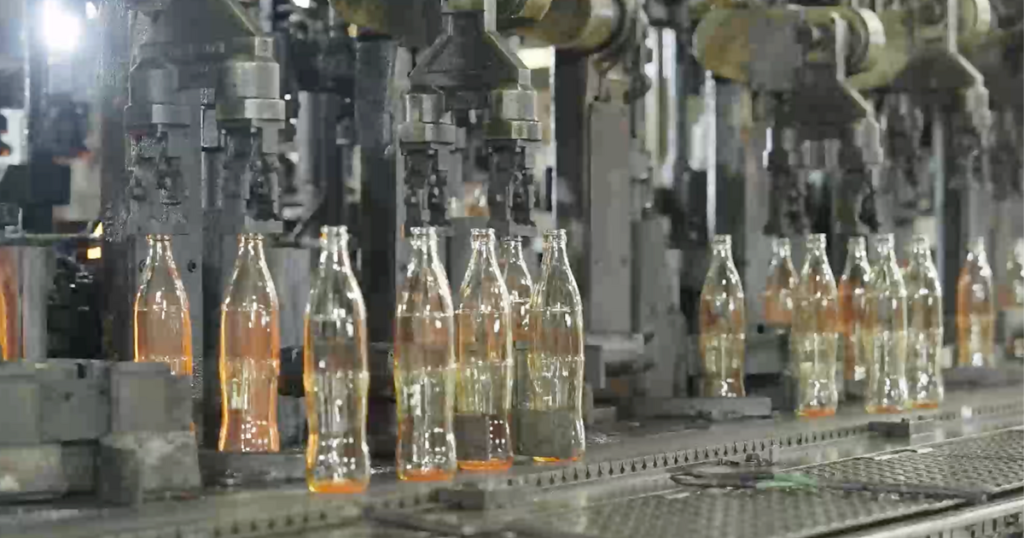Since its founding in 1974 as Delta Glass Company LLC, Beta Glass has grown significantly and consistently demonstrated its commitment to sustainability, innovation and quality. Major milestones over the past 50 years include the start of production in 1979, going public in 1986 and merging with Guinea Glass Company to form Beta Glass PLC in 2000. The company has continued to expand and optimize its operations into the 21st century, adding a second furnace to its Guinea plant in 2002, increasing production from 200 tons per day to 300 tons per day with a furnace expansion project in 2021, and most recently, rapidly upgrading the GF1 furnace at its Agbara plant.
Pioneer in glass container manufacturing
Beta Glass currently operates three best-in-class manufacturing plants in Nigeria with a daily production capacity of 720 tonnes, an annual production capacity of over 650 million bottles and jars, and a manufacturing capacity of 3.2 billion kroner and 5.5 million wooden crates. The company employs over 1,500 people across its facilities and is led by an experienced and dynamic management team and a recently reconstituted Board of Directors.
The current chairman of the board is Chairman: Dr. Vitus Chidiebere Ezinwais a seasoned leader with over 27 years of experience in diverse global companies across 15 African countries. During his first official visit to the Beta Glass Agbara plant in June 2024, the new Chairman launched the heating process of the newly refurbished GF1 furnace. Dr. Ezinwa himself said: “As Chairman of the Board, I have had the honor of activating Beta Glass's latest operational updates. This important milestone celebrates our company's unwavering commitment to expanding our production capacity and capabilities while maintaining the highest product quality.”
Upgrade and cold repair of GF1 furnace at Agbara plant Jagdish Agarwal, COO, Beta GlassThe project was completed in a record 32 days (20th May – 22nd June 2024) with glass-to-glass phased work to repair and rebuild the 60m2 furnace in stages, with collaboration from European, Asian and local Beta Glass Nigeria teams.
Agarwal said the repairs will increase production by 30 tonnes while extending the furnace's lifespan by eight to 10 years at just 30% of the cost of a major refurbishment.This achievement highlights Beta Glass's ability to grow sustainably and effectively while continually implementing cost improvement initiatives to better serve its customers in West and Central Africa.
Going forward, Beta Glass will remain committed to its mission of being a leading manufacturer and supplier of glass packaging solutions and driving exceptional consumer experiences across West and Central Africa.
In line with this, the company has expanded its efforts to promote a greener Nigeria through initiatives focused on educating the public on recycling, sustainability and environmental responsibility, including the establishment of glass collection centres in strategic locations in Lagos in collaboration with the Food and Beverage Recycling Alliance (FBRA) and the Recycling Scheme for Women and Youth Empowerment (RESWAYE).
Additionally, this commitment is also reflected in Beta Glass’s recently announced partnership with Wecyclers, an established Nigerian waste management company, to deploy trucks that will collect cullet (recycled broken and discarded glass) for recycling and reuse in the glass manufacturing process, conserving valuable and finite raw materials and further minimizing the company’s environmental impact.
Commenting on these high environmental standards and the company's pioneering sustainability efforts, Beta Glass' CEO said: Darren Bennett Vocistated: “We are more than just a supplier. We are a progressive partner dedicated to setting new standards in the glass container manufacturing industry.”
Beta Glass has always promoted sustainability, innovation and quality as evidenced by all its endeavours and achievements. By building on these three values, Beta Glass strives to provide superior glass solutions and make a positive impact on both the environment and the Nigerian business ecosystem.

